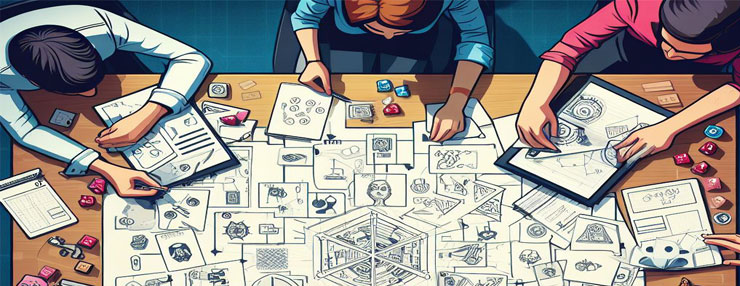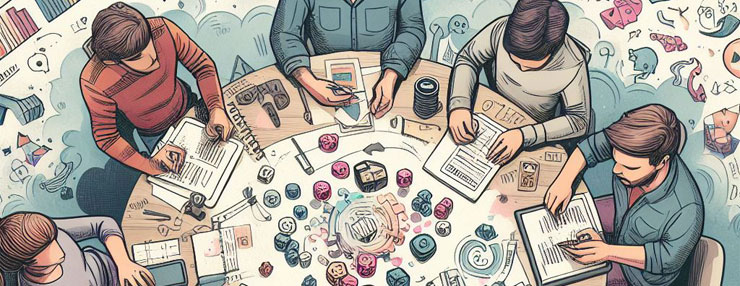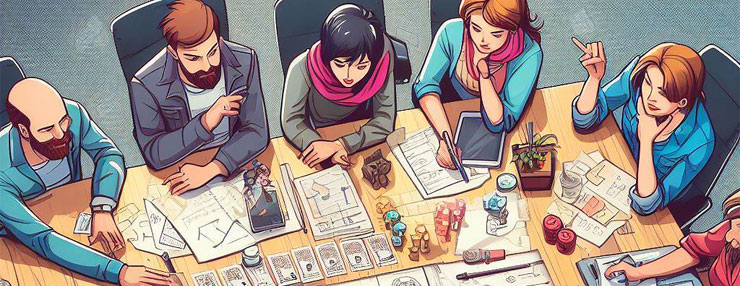Table of Contents
In-game development, creativity, and innovation often go hand in hand with the thrill of bringing unique experiences to gamers. However, in the quest to create the perfect board game, many developers make common mistakes that can hinder their success.
This article delves into the top blunders in board game development and offers insights on how to avoid them. Let’s explore the fascinating realm of board game design and learn the secrets to creating a winning game.
The Pitfalls of Rushed Prototyping
Rushing Through the Idea Phase
Before diving into the development process, it’s crucial to dedicate ample time to the idea phase. Many board game developers get excited about their concept and start building prototypes prematurely. This haste can lead to unrefined game mechanics and a lack of a clear vision. Instead, take your time to brainstorm, refine your ideas, and only move forward when you have a well-thought-out concept.
Neglecting Playtesting
Playtesting is a fundamental aspect of board game development, but it’s often overlooked in pursuing a finished product. Failure to playtesting can result in imbalances, unclear rules, or an unsatisfying gaming experience. To avoid this, involve playtesters early and gather valuable feedback to refine your game.
Not Iterating Enough
Developers often get attached to their initial game design and resist significant changes. However, this reluctance to iterate can be detrimental. Embrace feedback and be willing to make substantial adjustments to enhance your game. Refrain from settling for a subpar design when continuous improvement can lead to a remarkable final product.

Failing to Simulate Real Gameplay
Creating a board game that mimics real-life interactions and experiences is essential. Neglecting to simulate realistic gameplay can result in a lack of immersion. Board games should give players a sense of agency and connection, so strive to make your game as true to life as possible.
Overlooking Market Research of board game development
Ignoring the Competitive Landscape
One of the most common board game development mistakes is failing to conduct thorough market research. Overlooking the competitive landscape can lead to developing a game that is too similar to existing titles or doesn’t cater to an unmet demand. Research what other board game developers are doing and identify opportunities to stand out.
Neglecting the Target Audience
Understanding your target audience is paramount. Neglecting this crucial aspect can lead to a game that doesn’t resonate with your intended players. Consider the age, interests, and preferences of your audience, and tailor your game to cater to their desires.
Skipping Trend Analysis
The world of board games constantly evolves, with new trends and technologies emerging. Ignoring these trends can result in a game that feels outdated and irrelevant. Stay connected with the latest technological advancements and trends in board game design to ensure your game remains competitive.
Neglecting the Business Side
Board game development is not just about creativity; it’s also a business. Failing to recognize this can lead to financial challenges and limited exposure. Establish a solid business plan, consider distribution channels, and explore marketing strategies to ensure your game reaches its full potential.
Lack of Attention to Game Mechanics of board game development
Complex and Confusing Rules
Complex and confusing rules can be a significant turn-off for players. It’s vital to balance depth and simplicity in your game mechanics. Ensure your rules are easy to understand but offer depth and strategic opportunities.
Ignoring the Learning Curve
A steep learning curve can intimidate new players and deter them from enjoying your game. Consider providing tutorials or guides to help players grasp the rules and mechanics. A smoother learning curve can make your game more accessible and appealing.
Overlooking Player Engagement
Player engagement is a critical aspect of a successful board game. Neglecting this can result in a lackluster gaming experience. Incorporate elements that keep players engaged, such as dynamic gameplay, surprise elements, and opportunities for social interaction.
Inadequate Testing of Mechanics
Before finalizing your game, it’s essential to test the mechanics to ensure they work seamlessly and thoroughly. Inadequate testing can lead to glitches, imbalances, or broken gameplay. Make sure your game mechanics are rigorously tested and refined.
Art and Component Quality
Subpar Artwork and Design
The visual appeal of a board game plays a significant role in attracting players. Subpar artwork and design can deter potential buyers and diminish the overall experience. Invest in quality art and design to create an eye-catching and immersive game.
Low-Quality Components
Using low-quality components, such as flimsy cards or poorly made game pieces, can undermine the durability and perceived value of your game. Players expect sturdy, well-crafted elements that enhance their gaming experience. Invest in quality materials to make your game stand out.
Neglecting Accessibility
Consider accessibility when designing your game. Ensure that disabled players can enjoy the competition by providing alternative components or rules. An inclusive game can broaden your audience and make your game more appealing.
Lack of Branding
Neglecting branding can hinder your game’s recognition in the market. Develop a unique brand identity for your game, including a memorable logo and theme, to make it more identifiable and memorable.
Inadequate Testing and Feedback
Limited Playtesting
Playtesting is an ongoing process, and limited testing can lead to missed opportunities for improvement. Gather feedback from diverse players to refine your game and address any issues.
Ignoring Negative Feedback
Negative feedback can be challenging to receive, but ignoring it is a significant mistake. Embrace criticism as a chance for growth and improvement. Constructive feedback can help you identify and rectify issues holding your game back.
Lack of External Perspective
Board game developers often need to be more immersed in their projects, making it difficult to see the game from an external perspective. Seek feedback from individuals not involved in the development process to gain fresh insights and identify blind spots.
Not Playtesting with the Target Audience
Testing your game with the target audience is essential to meet their expectations. Don’t solely rely on internal testing; involve your intended players to gather valuable insights and refine your game accordingly.
Neglecting Marketing and Promotion
Ineffective Marketing Strategy
Even the most exceptional board game can only be noticed with effective marketing. Failing to create a comprehensive marketing strategy can result in limited exposure. Utilize various dealing channels, such as social media, board game forums, and conventions, to reach potential players.
Lack of Pre-Launch Hype
You are building anticipation for your game before its release is crucial. Refrain from generating pre-launch hype to avoid a lackluster launch day. Engage your audience with teasers, previews, and behind-the-scenes content to create excitement.

Ignoring Influencer and Reviewer Outreach
Influencers and analysts play a significant role in shaping the perception of board games. Ignoring their outreach can be detrimental. Reach out to influencers and reviewers in the board game community to gain exposure and honest feedback.
Underestimating the Power of Community
Building a community of dedicated fans can significantly impact the success of your board game. Refrain from fostering a supportive community to limit your game’s growth. Engage with your players, listen to their feedback, and create opportunities for them to connect.
Also Read: Quantum Machine Learning: Bridging AI and Quantum Computing
Last Words
Avoiding common board game development mistakes is essential to create a successful and satisfying gaming experience. Remember that board game development is both an art and a science, and balancing these aspects is key to making a unique and engaging game.
So, as you embark on your board game development journey, keep these lessons in mind, and may your creative endeavors lead to the creation of remarkable and beloved board games.
Contact us for more insights and guidance on board game development. Let’s create the next big hit in board games together.




